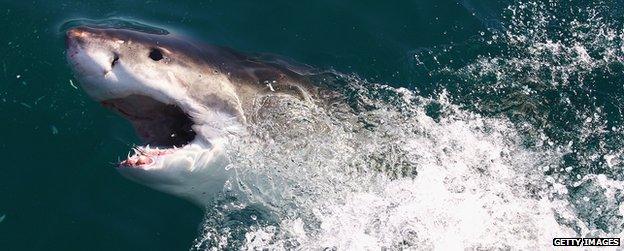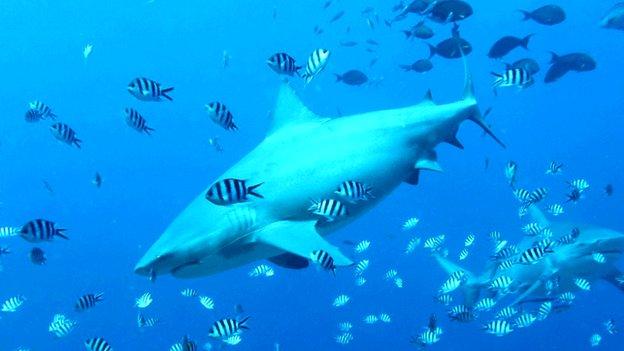US shark attacks: Teenagers injured off North Carolina coast
- Published
The two teenagers were injured in separate attacks off Oak Island in North Carolina, as Rajini Vaydanathan reports
Two teenagers have been badly injured in separate shark attacks at a popular seaside resort in the United States.
A 14-year-old girl was mauled while swimming off Oak Island in North Carolina on Sunday, while a 16-year-old boy was attacked on the same stretch of beach less than two hours later.
Mayor Betty Wallace told Reuters that the children had both lost limbs as a results of their injuries.
A helicopter was launched to search for the shark.
Both of the teenagers were swimming in waist deep water when the attacks occurred.
Ms Wallace said the girl was attacked shortly after 16:00 local time (20:00 GMT). A man swimming nearby heard her screams and came to her aid.
She was flown to hospital in Wilmington by helicopter but lost part of her arm and suffered a leg injury.
The boy lost his left arm shortly after the attack.

Shark attacks in the US

52 of the 72 attacks around the world in 2014 were in the US
three fatal attacks in 2014 but none in US
in US, most attacks occur in Florida (54%)
but also happen in Hawaii, South and North Carolina, California, Delaware, Georgia, Louisiana and Texas
surfers involved in 65% of 2014 attacks globally

"Honestly they have a really long road ahead", said one area emergency services director Brian Watts.
Investigators do not know the size of the shark or if the same shark attacked both victims.
Eyewitness Steve Bouser was on the beach at the time of the attack and described the scene as "quite nightmarish".
"I saw someone carry this girl and people were swarming around and trying to help," he told the Associated Press.
The boy was attacked about two miles (3 km) away on the same stretch of beach and also lost an arm.
Special patrols were launched along the shoreline, warning swimmers to get out of the water as crews searched for the shark.
Town officials decided on Monday not to close the beach to the public.
"I don't want everybody to think this is one of those areas where you really have to worry about shark bites. But for the foreseeable future, people have to be extra vigilant," Ms Wallace said.

- Published31 March 2014

- Published22 February 2015

- Published4 October 2014
